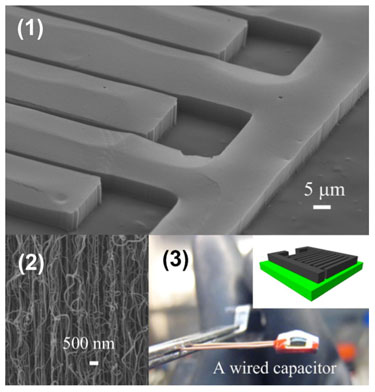Interdigitated microelectrode designs have been widely employed in electrochemical sensors. Decreasing the dimensions of the electrode and interelectrode gap shortens the response time of the device and enhances its cycling efficiency. These two attributes are desirable in the field of ultracapacitors (or supercapacitors), where power is often restricted by the widely distributed resistances that go hand-in-hand with the large capacitance. Carbon nanotubes (CNT) of one-dimensional conductivity are generally considered as model materials for this capacitor.

Ultracapacitor featuring vertically aligned carbon nanotubes
Researchers at the National Taiwan University of Science and Technology (Taipei, Taiwan) have developed techniques to prepare miniature planar CNT ultracapacitors via lift-off photolithography. They ensure electrical contact by gold-sputtering the CNT surface and inverting the patterned electrode.
In the study, the micro-ultracapacitor is inverted onto adhesive tape and can be transferred to any rigid or plastic substrate. One version of the wired micro-ultracapacitor features a drop of lithium gel electrolyte, which is capable of discharging 16.5 Wh kg–1 at a power of 50.0 kW kg–1 with a current density of 30 A g–1. The team also prepared an aqueous-electrolyte ultracapacitor that displays an energy density of 24.0 Wh kg–1 at a power density of 22.9 kW kg–1.
The interdigitated configuration adopted in these micro-ultracapacitors is particularly suited for flexible electronic applications.
About the author
Dah-Shyang Tsai is professor of chemical engineering at the National Taiwan University of Science and Technology, Taipei, Taiwan. His publications can be found on ResearchGate. He is currently studying various types of ultracapacitor and their performance with Ying-Sheng Huang and Kuei-Yi Lee (two professors of electronic engineering).

